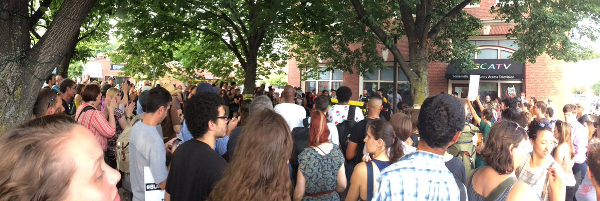For months, our fair city of Somerville has had a “Black Lives Matter” hanging across the front of city hall. This week, the police union decided to hold a demonstration about it; the union wanted the banner taken down, and replaced with one that said “All lives matter”. It’s not the first time a police union has taken this kind of position, and it got me thinking about the differences between “Black Lives Matter” and “All Lives Matter”.
Let’s start with “Black Lives Matter”. This statement started out by calling attention to racial inequities in the criminal justice system. Being black increases the chances that you’ll be killed by a police officer[1]. Being black increases the chance that you’ll be incarcerated. Being a black male means there’s a 1 in 3 chance that you’ll go to prison at some point in your life. “Black Lives Matter” speaks directly to these issues.
Now, let’s look at “All Lives Matter”. I see three ways to interpret this statement.
Universal Inclusion. The universally inclusive interpretation pulls no punches, and we can read the definitions straight out of a dictionary.
– All: every, entire, whole, universal
– Lives: the third person form of “to live”
– Matter: a subject of concern or action
In this context, “All Lives Matter” means that every single life is a subject of concern and the statement “Black Lives Matter” is trivially true and inoffensive: all lives matter, and black is merely a subset of all. The same goes for “Latino Lives Matter”, “Queer Lives Matter”, “Asian Live Matter”, “Immigrant Lives Matter”, “Muslim Lives Matter”, “Addicts Lives Matter”, or “Prisoner’s Lives Matter”.
Unfortunately, “All Lives Matter” tends to be used as a response (and even as a rebuttal) to the statement “Black Lives Matter”, so the universally inclusive interpretation is not the one we’re talking about.
Selective Inclusion. The selectively inclusive interpretation uses the word “all” to refer to a very specific group of people. Here’s an example
We hold these truths to be self-evident, that all men are
created equal, that they are endowed by their Creator with certain
unalienable Rights, that among these are Life, Liberty and the pursuit
of Happiness.
The authors of the Declaration of Independence used the word “all” in a selective sense. They were talking about well-to-do white men. The weren’t talking about Native Americans, and they sure as hell weren’t talking about blacks. In this context, “All Lives Matter” gives the illusion of inclusiveness, but it really means “hey, you got the wrong group”.
Selective Exclusion. In this interpretation, the word all is intentionally meant to exclusive. “All Lives Matter”, is really saying “No, black lives don’t matter at all”.
* * *
The police unions could be using the second or third interpretations. Or, they might feel like the long arm of the law is getting the short end of the stick. They’re not happy about being called out, and they’re trying to shift attention away from their bad behavior.
This isn’t to say that all police officers are bad. There are cops for whom I have a great deal of admiration and respect. They have my admiration and respect for exactly one reason: their conduct. Wearing a uniform doesn’t matter nearly as much as what you do while you’re wearing it. If the police want the public to treat them with respect, then they’ll need to show that same degree of respect to the public.
[1] In 2015, the Guardian’s “The Counted” project started keeping track of people killed by US police officers. No US government agency keeps track of these statistics, so these private database are our best insight into this phenomenon. 1146 people were killed by police in 2015. The highest rates were among Blacks, at 7.66 per million, or 306 of 1146 (27% of total). The second-highest rates were Native American, at 5.49 per million, or 13 of 1146 (1% of total). So far, 623 people were killed by police in 2016. The highest rate is among Native Americans, at 5.49 per million or, 13 of 623 (2% of total). The second highest rate is among Blacks, at 3.83 per million, or 153 of 623 (25% of total). Bearing in mind that we’re only seven months into the year, the rate of Black deaths at the hands of police has stayed about the same, while the rate of Native American deaths has essentially doubled. It would be worthwhile to understand this difference.


Nice article. The issues is like what I see with the DNC and RNC – only some lives and votes really matter and “pay to play” corruption has never been so strong in America. As we have seen with the recent Court decisions to hold police accountable and the one were the boy was hauled off to Juvenile Hall for being a boy and burping for fun during PE class as “interfering with the education process” as a total corruption of the Justice system in America. This goes along with all the other areas of corruption from the Panama Papers to the Student loan to the Payday loan and Wall Street corruption that NO is held criminally libel for.
Unless we return to real rules of law that protect real people we here in America will continue to see a sharp increase in civil disobedience and violence direct toward the police, government and business interests.
Keep up the good work!